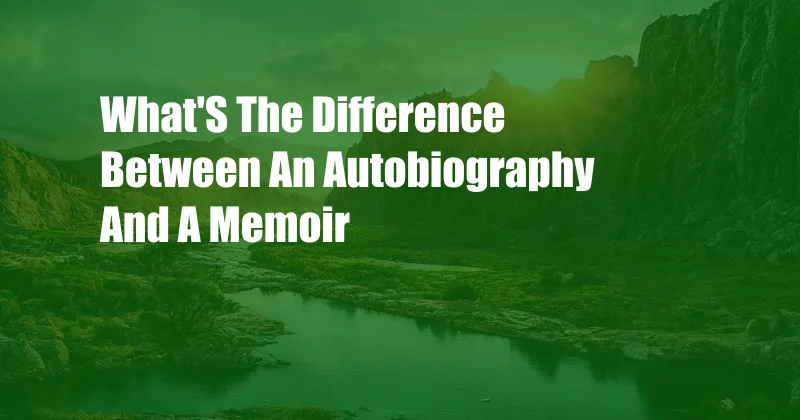
The Art of Personal Storytelling: Autobiography vs Memoir
In the realm of literature, personal narratives unveil a captivating journey into the lives and minds of individuals. Among these narratives, autobiographies and memoirs hold a distinct place, captivating readers with their intimate accounts of life experiences. While frequently intertwined, these two genres possess unique characteristics that set them apart.
Recounting a complete life journey, an autobiography stands as a comprehensive self-portrait, unraveling an individual’s story from birth to the present day. It meticulously chronicles major events, turning points, and formative experiences that have shaped the author’s identity and worldview. The focus lies on providing a factual and chronological account, adhering to the timeline of the author’s life.
Memoir: Exploring the Prism of Memory
In contrast, a memoir delves into specific moments, themes, or episodes that have had a profound impact on the author’s life. It often centers around a particular period or aspect of the author’s history, rather than attempting a comprehensive overview. Memoirs allow for greater flexibility in narrative structure, embracing a subjective and introspective approach. The author’s emotions, reflections, and interpretations take center stage, illuminating the personal significance of the experiences recounted.
Autobiography: A Journey of Self-Discovery
Drawing upon life’s extensive tapestry, autobiographies offer a panoramic view of an individual’s existence. They provide a comprehensive understanding of the author’s upbringing, education, career, relationships, and achievements. By presenting a chronological account, autobiographies serve as a record of a life lived, offering insights into the author’s development, motivations, and decision-making processes.
Serving as a mirror of self-reflection, autobiographies enable authors to explore the complexities of their own identity and purpose. They grapple with questions of meaning, identity, and legacy, seeking to make sense of their life’s journey. Readers gain a deeper understanding not only of the author’s experiences but also of the human experience itself.
Autobiographies have played a pivotal role in historical and social understanding, providing firsthand accounts of significant events and shedding light on the lives of notable individuals. From the poignant narratives of Frederick Douglass and Harriet Tubman to the introspective reflections of Maya Angelou and Barack Obama, autobiographies have enriched our collective knowledge and inspired generations.
Memoir: Fragments of a Life
Memoirs, on the other hand, offer a more focused and introspective exploration of the author’s life experiences. They delve into specific moments, themes, or relationships that have had a profound impact on the author’s development and identity. By zooming in on particular aspects of their history, memoirs provide a nuanced and deeply personal perspective.
Through the lens of memory and reflection, authors craft memoirs that illuminate the emotional and psychological landscapes of their lives. They explore themes of love, loss, trauma, and redemption, weaving together personal experiences with broader insights into the human condition. Memoirs often serve as a form of catharsis, allowing authors to process and come to terms with past experiences.
The Essence of Storytelling
Ultimately, both autobiographies and memoirs fall under the umbrella of personal storytelling. They offer unique opportunities for authors to share their experiences, insights, and reflections with the world. While autobiographies provide a comprehensive account of a life journey, memoirs delve into the depths of specific moments and themes.
Whether you choose to write an autobiography or a memoir, the key lies in crafting a compelling narrative that resonates with readers on a personal level. By embracing authenticity, introspection, and the power of storytelling, you can create a work that not only chronicles your life but also touches the lives of others.
Expert Advice for Writing Personal Narratives
Tip 1: Embrace Vulnerability and Honesty: Personal narratives demand a willingness to be vulnerable and honest about your experiences. Authenticity is key to establishing a connection with readers.
Tip 2: Delve Deep into Emotional Truths: Focus on exploring the emotional truths of your experiences, rather than merely recounting the facts. Your readers will be drawn to the raw emotions and insights you share.
Tip 3: Find Your Unique Voice: Discover and harness your unique voice as a writer. Your perspective and experiences are what set your narrative apart, so don’t try to imitate others.
FAQs on Autobiography vs Memoir
Q: What is the difference between an autobiography and a memoir?
A: An autobiography provides a comprehensive account of an individual’s life, while a memoir focuses on specific moments, themes, or episodes that have had a profound impact.
Q: What is the purpose of an autobiography?
A: Autobiographies offer insights into an individual’s life journey, development, motivations, and decision-making processes.
Q: What is the purpose of a memoir?
A: Memoirs explore the emotional and psychological landscapes of specific experiences, offering nuanced and deeply personal perspectives.
Call to Action
If you’re passionate about sharing your story, whether through an autobiography or memoir, embrace the opportunity to connect with readers and make a meaningful contribution to the literary landscape. Remember, the most compelling narratives are those that are authentic, introspective, and crafted with a heartfelt desire to share.
Would you like to delve deeper into the fascinating world of autobiography and memoir? Share your thoughts and questions in the comments below, and let’s continue the conversation about the art of personal storytelling.